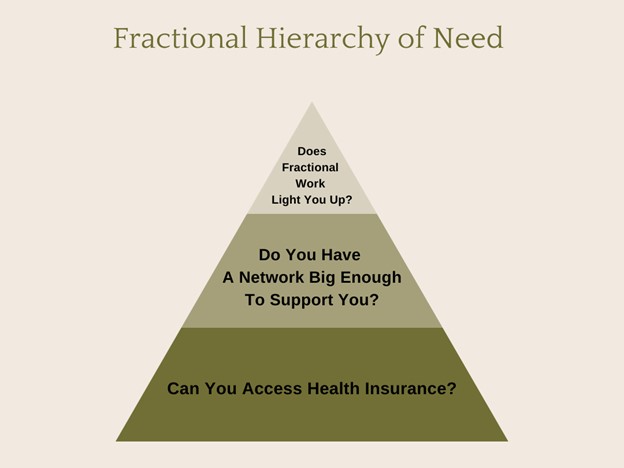If it seems to you that everyone is going fractional these days, you're not alone. According to Google Trends, search-term interest of "Fractional CMO" totaled 284 in 2018 and jumped to more than 2,043 in 2022—a 600% increase!
There are a lot of reasons for that growth in interest. Gen X, Millennials, and (my personal favorite subgroup) Xennials know that, unfortunately, few companies reward loyalty today. In addition, many of those folks have reached at least two decades in the workforce—more than enough experience to go out on their own.
In today's dynamic landscape, there's less time for CMOs to ramp up and build an organization with a five-year plan. Enter the fractional CMO, who brings expertise as a "hired gun," with more cross functional expertise, more objectivity, and less ego.
Unsurprisingly, as someone who has run a fractional CMO practice, I get asked about it a lot.
The fractional CMO conversation starts out something like this...
'Have you had success as a fractional CMO?'
Success has come in waves. The first two years were gangbusters (I made more money than any previous full-time job I held, and I was working fewer hours), but Year 3 started out slow. The recession fears and the SVB scare certainly had an impact on my business (as they have on many other services-based businesses). It's not all roses all the time.
'Can you be fractional without 'hustling' for business?'
The world "hustle" is often associated with sales, and most folks not in sales tend to shudder at the term. Though I don't fear sales, I do believe in the long game. I don't offer a widget, so I'm looking to drive ongoing mutually beneficial relationships. Not surprisingly, my "sales" techniques are for the most part long-game marketing: writing articles, speaking on podcasts; most important, I try to provide as much value to my network as possible.
'What is the difference between fractional and consulting?'
Fractional is a part-time role for approximately six months (or more) and probably at least 15 hours a week. As a fractional CMO or COO, I often receive an @company email, evaluate teams, audit systems, and coach up (or out) employees. I have a handle on and drive actions toward the overall business objectives. I'm also often a sounding board and ear to the CEO, who may not want to discuss certain frustrations with C-suite colleagues directly.
Consulting is for the most part project-based: Think shorter timelines and defined deliverables.
Then the conversation shifts toward 'Is fractional right for you?'
When I meet with folks interested in exploring fractional work, I use the following rubric to lay out what I consider to be some of the important questions to ask. I call it a "Fractional Hierarchy of Need."

1. Can you access health insurance?
Unfortunately, health insurance is still among the No. 1 concerns when going out to start a consultancy, business, new opportunity.
The healthcare marketplace does provide some options, but for those of us who have spent our lives in jobs that provided steady and reliable health insurance, independent health insurance is not an equivalent. It's unfair, frustrating and something uniquely American; but it is the reality.
I'm very honest in saying I get my health insurance through my spouse. I'm lucky, and I don't gloss over that when talking to folks. Insurance is a real concern in the evaluation process. Many people I talk to are just leaving jobs and have the option of COBRA, which is great as it affords someone an 18 month runway to try to make a go of fractional work.
2. Do you have a network big enough to support you?
I built my network throughout a 20-year period by always saying yes. I say yes to meetings with people who want my advice, I say yes to speaking engagements, I say yes to writing opportunities, yes to mentoring, and yes to volunteering. Whenever possible, I say yes—because despite knowing that 90% of the conversations I have won't turn into "wins" right away, there is a good chance they will turn into wins (for me or someone else) later on.
That strategy served me well when I had a full-time job, and it serves me even better now that I run my own fractional firm. Having the social capital banked will be what helps you grow and succeed as you decide to go out on your own.
If you are considering fractional work and you are someone who doesn't have an extensive network, you might want to consider that...
- You will probably need to do more outbound sales activity — which is great if you're comfortable with that.
- If sales isn't your thing, whether finding another full time role might be the better move.
3. Does this type of work light you up?
Years ago, when speaking with a brand new colleague at a company where I was an employee, she said, "I just hate the first year of a new role. Nothing is set, everything is new, I have to build from scratch."
My jaw hit the floor. I couldn't believe it. The first year was my favorite time: I loved the building, scaling, and trying out new things. You are afforded so many opportunities in those first 12 months; you aren't yet beaten down by politics or the "we've already tried that" mentality. You have a fresh perspective.
After 12 months at a full-time job, the work becomes more rinse and repeat; and that never got me going. That is how I knew I would love fractional work. I really like the beginning; I want to be a part of the setup and the start line. I don't need to see the project to fruition to get satisfaction and feel gratified.
If you need to see the end of the project , fractional work will not light you up.
* * *
Although "Fractional CMO" has become a trending term, the practice, for many of us, is here to stay.
The opportunity to be a fractional CMO and to lead a practice is a tremendous privilege. I find a lot of fulfillment in both the work I do and the opportunity to mentor people who are considering becoming fractional. For many, I'm able to shine a light on a new world, a new way of thinking, new ways of using skills and benefiting businesses. For others, I've walked them through a scenario that doesn't work for them in their specific place in life. In both cases, the Fractional Hierarchy of Need provides clarity.
More Resources on CMO Careers and Fractional
It's The Golden Age of Marketing. So Why Is the Fractional Model So Attractive?
CMOs Need to Focus to Survive: Three Priorities to Ditch and Three to Latch On To




